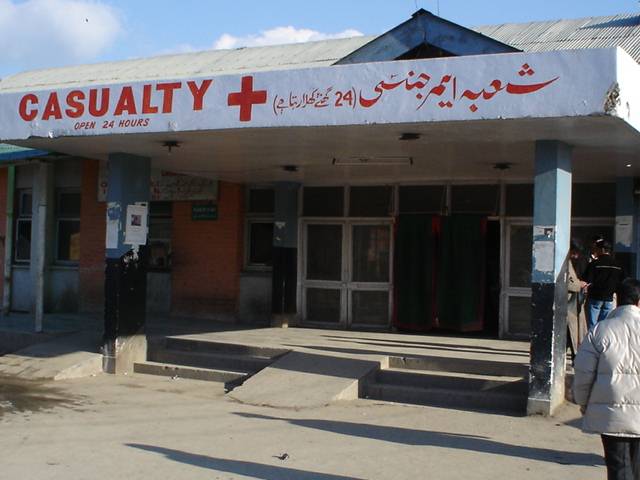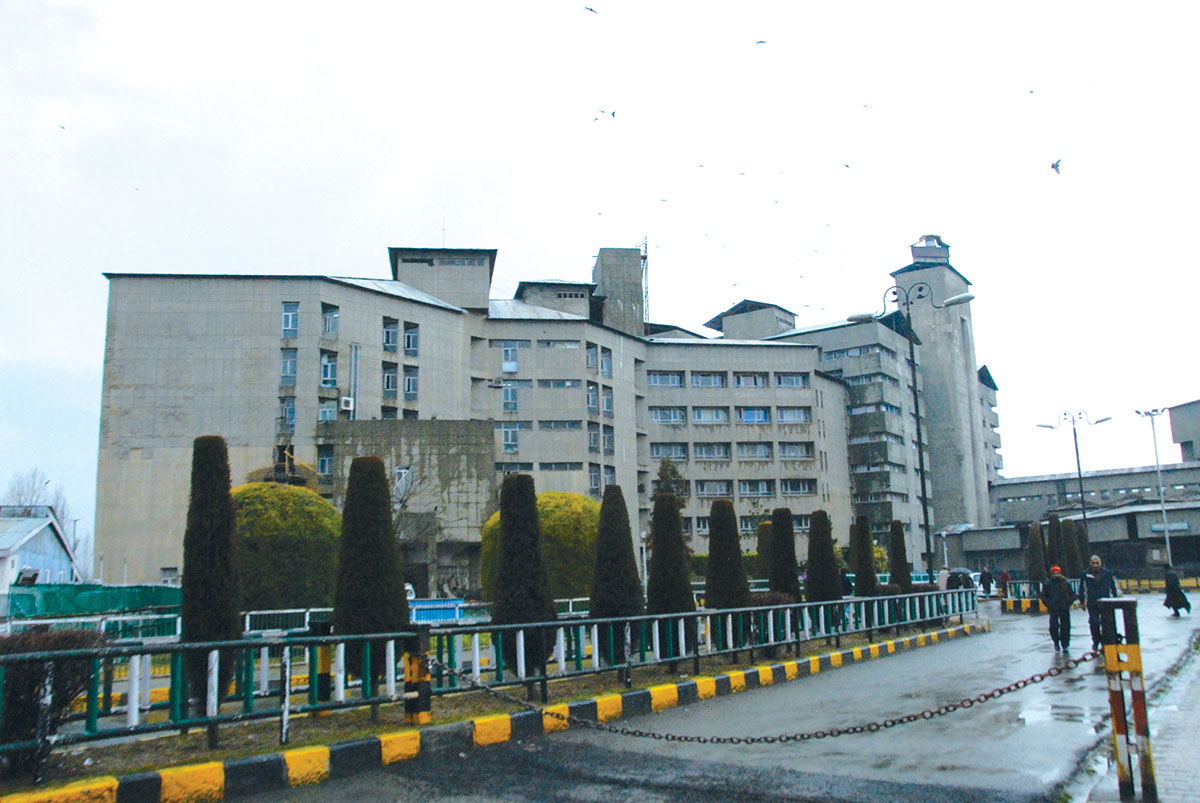by Tanveer Ahmad Kumar
The abolition of Article 370 on August 5, 2019 marked the end to this injustice prevalent due the corrupt system and ray of hope for the pharmacy professionals.

Last week on September 25, was celebrated the World Pharmacist Day as it marks the existence of International Pharmaceutical Federation (FIP) in 1992. Each year there is a theme announced for world pharmacist’s day. Transforming Global Health was the theme of world pharmacist day 2020. The aim of this day is to show how pharmacists contribute to the world where everyone benefits from access to safe, effective, quality and affordable medicines and health technologies, as well as from pharmaceutical care services.
The world pharmacist theme this year was an opportunity to communicate how pharmacists are transforming health a variety of health services in their communities, including advising on healthy living, vaccinating to prevent disease, and ensuring that medicines are taken correctly, thereby managing disease well and improving quality of life. It also covered how pharmaceutical scientists transform and prolong people’s lives by developing safe and effective medicines and vaccines. On the education front, pharmacy educators are transforming outcomes by ensuring that there are enough qualified pharmacists and scientist to meet the growing needs of our societies.
In Identity Crisis
Do you know what pharmacists in our part of the globe are up to? The world is focussing on more quality pharmacists and utilizing their role in providing best quality health care services to the society but here pharmacists are moving from pillar to post for getting their recognition. The world has moved from traditional role of pharmacy i.e. dispensing to modern roles of clinical pharmacy.
Clinical pharmacy is defined as that area of pharmacy concerned with science and practise of rational medication role. Clinical pharmacy is a health science discipline in which pharmacist provide patient care optimizes medication that promotes health, wellness, and disease prevention. The practice of clinical pharmacy embraces the philosophy of pharmaceutical care; it blends a caring orientation with specialized therapeutic knowledge, experience, and judgement for the purpose of ensuring optimal patient outcomes. As a discipline, clinical pharmacy also has an obligation to contribute to the generation of new knowledge that advances health and quality of life.
In India Pharmacy Council of India (PCI) regulates education as well as the profession of pharmacy. However, in Jammu and Kashmir drug laws were regulated by Jammu and Kashmir Pharmacy Council and all good governing laws of pharmacy were not applicable. Due to non-availability of pharmacy qualified professionals at the time Jammu and Kashmir Pharmacy Council came into existence in 1956, non-pharmacy qualifications like medical assistants and those getting five-year experience at a pharmacy shop were incorporated and were given registration under the council with the aim that after state gets the qualified pharmacy professionals, education regulations will be incorporated and the profession of pharmacy will be made at par with national standards.
A Professional Course
Acting on the same aim departmental of the Pharmaceutical Sciences University of Kashmir was established in 1985 and started a Bachelor’s course. Now when the aforementioned department started training the professionally qualified graduates till then the state has become so reluctant to incorporate them as non-pharmacy practitioners have strengthened their roots and kept derailing the noble profession in the state of Jammu and Kashmir.
The said department in 2009 started the post-graduate programme in five different specialisations viz Pharmaceutics, Pharmacognosy, Pharmacology, Pharm Chemistry and Pharmacy Practice but the Jammu and Kashmir government continues to engage under-qualified, less trained medical assistants to work in place of pharmacists.

This dangerous impersonation has ruined the profession of the pharmacy in Jammu and Kashmir and tarnished the actual role of pharmacists and their image. Qualified pharmacists possessing graduate or postgraduate degrees were labelled as overqualified and their applications for positions of pharmacist were not even entertained resulting in their mental trauma. They were left with no option other than to serve outside and even some changed their profession after getting postgraduate degrees in pharmacy.
Due to this identity crisis, qualified pharmacists moved from pillar to post for their recognition and lost their precious times in circumgyrating around courts and administrative offices. Even after getting the court orders for higher qualification eligibility in pharmacists posts notified earlier are yet to be implemented.
End of Hegemony
However, the abolition of Article 370 on August 5, 2019, marked the end to this injustice prevalent due to the corrupt system and ray of hope for the pharmacy professionals. The implementation of central pharmacy laws to the union territories of Jammu and Kashmir and Ladakh ended the hegemony and monopoly and shook the nerves of under-qualified practitioners as now as per central laws every Tom, Dick and Harry can’t enter the profession of pharmacy without valid credentials – the old practice prevalent in Jammu and Kashmir.
Under section 12 of the central pharmacy act, only the qualification of diploma in pharmacy (D Pharma), bachelor in pharmacy (B Pharma) and Doctor of Pharmacy (Pharm D) are approved for the purpose of the registration as pharmacists. However, the majority of the pharmacists who have been registered under JK pharmacy act, are matriculated without required Pharmacy education and therefore didn’t qualify for registration under the central Pharmacy act, 1948.

Now a move has been initiated to incorporate the under-qualified practitioners again for registration which will be a suicidal and gross violation of Central Pharmacy Act. This is the matter of serious concern and onus lies on the administration to allow such move. Such moves are attempted to derail Kashmir’s health care system, thereby keeping it at par with the national and international levels a distant dream.
It is pertinent to mention here that medical assistants are trained to assist doctors like nursing aides and technical assistants. By calling medical assistants Pharmacists is sheer injustice to the profession of pharmacy per se because neither their curriculum nor their expertise in any form reflects the work of pharmacists.
Why This Mess?
One fails to understand if the mess in Kashmir was cleared after the abrogation of Article 370, why corrupted roots are being nurtured again?
Either they should be given separate cadre under the paramedical council or bridge course in pharmacy should be started not only for recently MAC pass out students but also for the ones who are engaged in the government sector as a pharmacist to make them at par with the pharmacy profession. It is the responsibility of the PCI to safeguard interests of pharmacists and rectify the faulty system prevalent here and any dilution in the existing laws will lead the council to face legal consequences. If any dilution is planned or proposed, then it is better to give Pre-August 05 status as central laws will lose their relevance and credibility.
Why Reluctance?
Now, the question arises why the health system in Jammu and Kashmir is reluctant to incorporate professional pharmacy services? Why the patients of this part of the globe are left to the mercy of these underqualified and untrained persons? This under-qualified class has made the life of patients miserable and has given birth to many problems like the development of anti-microbial resistance due to irrational use of antimicrobial agents, growing concerns of kidney diseases due to indiscriminate use of pain killers, the rise of counterfeit medicines, illegal sale of drugs with abuse potential, indiscriminate use of steroids and other narrow therapeutic drugs risking the lives of patients.
It is well said that “poison in safe hands becomes the medicine and medicine in wrong hands becomes the poison”. Why malpractice is encouraged by the people at the helm of affairs? Why authorities are hell bend to put the ball in the wrong court and putting the precious human lives in danger.

The pharmacy professionals urge the administration to implement the Central Pharmacy Act of 1948 with pharmacy education regulations-1991 in letter and spirit without any dent or dilution. Clinical and hospital pharmacist posts should be created in PHCs Primary Health centres and CHCs community Health centres at Panchayat level and block/tehsil level respectively. There should be a presence of pharmacy officer (PO) working under medical officer at PHC level and Block pharmacy officer (BPO) working under block medical officer at CHC level. Similarly, each district should have a Chief Pharmacy Officer (CPO) working under the Chief Medical Officer.
Drug inspectors should be appointed at tehsil level in addition to their appointment at the district and regional level for proper regulation. All hospitals in Jammu and Kashmir need to have a full-fledged department of pharmacy with adequate infrastructure, manpower, equipment and funding towards establishing clinical pharmacy practice departments. Diploma in pharmacy should be started in all polytechnic colleges and inclusion of B Pharmacy and M Pharmacy as qualification criteria for teaching posts in these colleges.
(Author is pursuing his masters in pharmacy (Pharmacy Practice) at the University of Kashmir. The opinions expressed in this article are those of the author’s and do not purport to reflect the opinions or views of Kashmir Life.)















